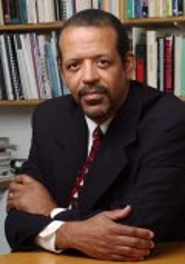
Ronald Ferguson, one of the foremost scholars on the racial achievement gap, spoke to the Hamilton community as part of the Levitt Center Program on Inequality and Equity. The senior lecturer for the Harvard Graduate School of Education and the Harvard Kennedy School discussed “Educational Excellence with Equity: a Social Movement for the 21st Century.”
Ferguson’s anticipated focus on racial inequality gave way to concern for the academic achievement of American children of all races. In order to replace the baby boom generation with a skilled workforce, Ferguson warned, our schools must train that skilled workforce. “This is not just about closing achievements gaps. This is not just about student of color,” Ferguson said. “Even our white students have to do better.”
Ferguson shared the stories of two school districts with superintendents who struggled to close the racial achievement gap. These superintendents eventually alienated parents in the community who felt that the success of above-average students was compromised by the district’s attention toward below-average students. In order to avoid situations like these, Ferguson explained, American schools must work for the betterment of all students. He encouraged districts to stop worrying about gaps within their districts and set benchmarks externally, so that everyone can celebrate when the district meets its goals.
“We’re not training kids to compete with their classmates,” Ferguson noted. “The goal is to have them compete with the world.”
So far, the American debate over educational achievement has centered on policy. Americans ask how their government should modify policy and how they should enforce it in order to bring about improvement. Ferguson expressed his belief that the responsibility for change lies with society itself. The increasing agreement that an educational problem exists, Ferguson said, should give rise to a social movement.
This social movement will happen primarily along five fronts: parents, teachers, peers, employers and the community. Every group must actively involve itself in the improvement of community children. “The kinds of things I’m talking about won’t just happen by accident,” Ferguson remarked.
Teachers can begin to implement changes in their own methods without instructions from the federal government. The best way to start, Ferguson said, involves simply talking to each other. Teachers need to talk about their methods with each other in order to receive feedback and hear new ways to be successful. Ferguson noted that most teachers only have other students watching them. “In the best schools, teachers watch each other teach,” he explained. “And they talk about what they see.”
Outside employers would ideally play a completely new role for schools. They would forge relationships with schools to expose students to the lives they might live once they leave school, learning about the “possible selves” they could be. Ferguson praised an initiative called “They Made It, So Can I,” which brings workers into classrooms to tell their life stories, beginning in fifth grade. Bringing these ideas of possible selves to young students can help them set goals and gain the confidence to work toward them.
Ferguson emphasized the importance of the spread of information. The ways in which the movement reaches parents, he said, might initially be small, but small amounts of information can have a huge impact. Simply sharing knowledge on the importance of speaking to a child, even baby, could lead a parent to modify their habits and immeasurably improve the life of the child. Community programs would also facilitate this spread of information, and they need not be expensive, large-scale projects. Ferguson related the answer of one community leader when Ferguson asked how he brings parents together. “He said, ‘I stick them in a room with other parents who have had the same issues and they talk about it.’”
During the question and answer session following Ferguson’s talk, a student asked how Ferguson expects peer dynamics to change. Ferguson responded that classrooms must create opportunities for people to share their values. Studies he described earlier in the presentation show that students wish behaviors like work ethic and kindness were “cool,” but laziness and meanness preside because students believe that those are the values their peers applaud.
Ferguson described an 11th grade classroom he visited for a talk on these values. When he asked whether they agreed with what he was saying, “They looked around the room before they raised their hands, and then their hands kind of snuck up!” Their initial hesitance gave way to confidence when they saw that they were not alone.
A social movement toward equality in educational achievement should involve many opportunities for these individuals to come together. Once smaller units begin working together, larger units can as well. Ferguson speaks of equality as a national project in a global context. “There is something motivationally appropriate in wanting to be the best in the world,” Ferguson concluded.
